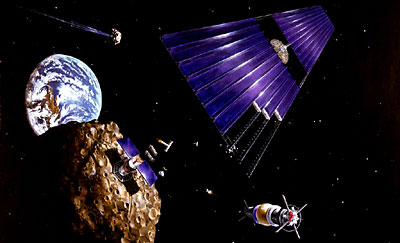Using space resources to help all of humanityby Greg Anderson
|
| The key question may be: how do we most efficiently tap solar system resources to focus on the major needs of humanity while maintaining a vibrant and strengthening capitalist economy? |
In addition to that greater scientific understanding, we are also developing the capacity to bring extraterrestrial resources into an expanding human economy. Two American companies, Planetary Resources and Deep Space Industries, are planning to make their money by mining asteroids, and the US government has taken a first step to support that new industry. A section of the US Commercial Space Launch Competitiveness Act of 2015 gives American companies the right to extraterrestrial resources they extract. Other companies from various nations are looking at the Moon, and various nations have expressed interest in joining an international effort to establish a base on the Moon. Private companies are also interested in lunar settlement. That, too, would expand the human economy. Linking the public and the private lunar efforts could produce a powerful economic driver.
The timing is propitious. Though many poor nations are on their way up the wealth ladder, a huge percentage of humanity still lives in abject poverty. Too many die from diseases that have been essentially conquered in the developed world. These nations need to build infrastructure, and develop their national and regional economies. If climate change goes badly, countering it will be incredibly expensive—and much of the world is already deep in debt. A larger, expanding economy is exactly what is needed.
The key question may be: how do we most efficiently tap solar system resources to focus on the major needs of humanity while maintaining a vibrant and strengthening capitalist economy? Maintaining capitalism is not simply an ideological quirk; variations on the capitalist theme have built the economy and the world we have today. Some would say that’s not an unalloyed positive, but if the point is to create wealth quickly and efficiently, using capitalist principles is the way we know to do it. Within that broad tradition, there are several ways to allocate resources.
The most direct is the least capitalist: have government do it. For example, let’s assume a near-Earth asteroid is assayed by robotic probes and found to contain a trillion dollars worth of precious metals, which is a reasonable possibility. How do we bring that wealth into the human economy? The first choice might be to let the company that conducted the assay claim the metals, thus becoming the richest company in the world overnight. Likely, that won’t happen. The company could be free to put a healthy percentage of the assayed wealth in its asset column, but claiming all of it probably won’t fly. Current law is a bit hazy, but it seems to say that wealth belongs to humanity as a whole. Let’s go with that.
If the new wealth essentially, and loosely, constitutes a kind of community property, using it to underwrite international development projects seems reasonable as, it could be argued, such projects benefit humanity. Using it to wipe out a given nation’s debt, for instance, would be an act of a different character. Individual national governments might claim part of it to support development programs those governments would run directly. That might pass theoretical muster, but we can do better.
The nut that needs cracking is determining a way to link specific wealth to specific projects. Without that clarity, the situation could easily collapse into chaos, and perhaps into war. Wars have been fought over much less than a huge pot of gold. An international board backed by the United Nations might oversee the funding and execution of projects, but that would risk bringing power politics, corruption, and bureaucratic ineptitude into the heart of the future with little outside control.
| By creatively reaching into space to expand our economy and our capabilities, we can also expand the moral basis of a new and rising civilization. |
Another way might be to create development bonds similar to municipal and industrial bonds that investors could buy for specific projects, thus opening those projects to public scrutiny. Someone with the authority to direct the extraterrestrial wealth into the projects created by the bonds would have to connect the two, of course, creating a bond market supported by that wealth. Several chartered institutions around the world might be founded to do that task. Such institutions might financially back a given set of potentially interrelated projects. Those projects might focus on a particular area on Earth, such as developing a critical aspect of science or technology. Investors would put initial money into the institution, which would use the money to further refine its plan and to hire or partner with a space operations company that would actually fly a mission to assay an asteroid. Thus, development projects would be directly tied to and supported by specific stores of real wealth.
Every mission will not hit the jackpot, of course. Exploring space is tough, and there will be spacecraft systems failures. A successful assay also might not find precious metals, but it will find something. Water will be extremely valuable to both human and robotic operations. Even ordinary dirt and rock, if properly placed, would be valuable as radiation shielding. A commodity market will develop, followed by a futures market. Those who own the fundamental rights to those resources will stand to do quite well.
So will the old, the ill, the poor, and the very young. Economic and technological progress has too often left behind those who could not cope with a new world, and those people stand to be the first to go down in a future dominated by disaster. By creatively reaching into space to expand our economy and our capabilities, we can also expand the moral basis of a new and rising civilization.
